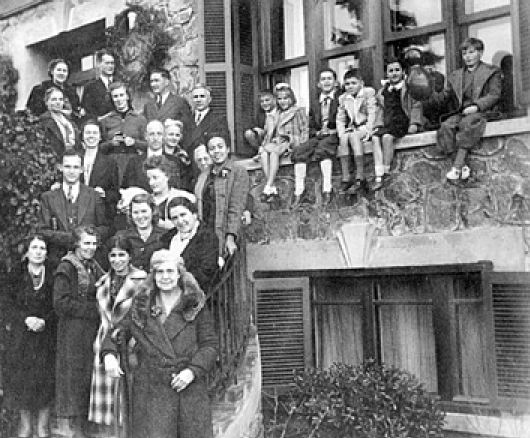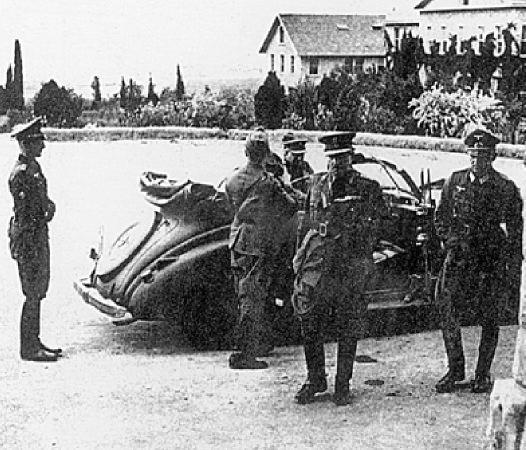 |
||
|
War, Suffering and Tea on the Porch |
||
|
In 'A History of Anatolia College: 1933-1950', Alice S Riggs outlines the trials and tribulations of being the school president's wife during World War II By SARAH REES WITH its cumbersome, grey cover and a title that would only spark the interest of an Anatolia College enthusiast, it would be a miracle if a single aesthetical aspect of this book prompted anyone to pluck it off a bookstore shelf. But, once again, the old adage "don't judge a book by its cover" holds true - the book is a good read. |
 Riggs family members pose for a 1939 Christmas photo together with Anatolia College staff |
|
|
A History of Anatolia College: 1933-1950 details the years that Alice S Riggs spent at the school while her husband Ernest Riggs served as its president. Founded in 1886 by US missionaries, the Thessaloniki school is now considered one of the best secondary schools in Greece. Due to the outbreak of the Second World War, Riggs' years at the school were turbulent ones. Her memoir tracks the buildup to the war, as well as its aftermath and impact on the school and Greece. The historical coincidence of Riggs' presence at the school when the war began turns what would be an upbeat but bland memoir into a compelling piece of social history, giving the reader a glimpse into the realities of the war in Greece.
Upon opening the book, it is easy to feel that you have stumbled into the centre pages of a diary, as Riggs' story storms straight into an account of her being jostled off a train accompanied by "Sunny", who could be her son, daughter or pet. However, once you get beyond the initial alienation, it is easy to slip into Riggs' anecdotal and persnal style of writing. |
||
 |
"On our arrival in Thessaloniki, any mention of a visit to the new campus was invariably accompanied by the words, 'I do hope Olympus will be out.' There must have been a reason, of course, why the ancient Greeks thought of it as the home of their gods, but this modern enthusiasm got to be a bit boring." |
|
|
insightful and recorded with a lively optimism that sees her through the dismal days of war and beyond. Riggs' resolutely American way, even in foreign lands - lots of Thanksgiving meals and home-baked cookies - will appeal to American readers' sensibilities, especially expatriates who can relate to the experience of adapting to new surroundings.
Just as we get into the swing of life in Salonica (as Riggs' fondly refers to Thessaloniki), the Second World War creeps up on Europe, and we are privy to the terrifying buildup to the Nazi occupation. The Germans take over the college buildings for military purposes, and Riggs and her family flee Greece at the eleventh hour to return to America. Although separated by the Atlantic, Riggs and her family do everything they can to send aid and support to their friends and colleagues left behind, and thus we are kept informed of the effect of the war on day-to-day living. |
||
An extract of a letter to Ernest Riggs from a colleague in Greece reads: "I have never dreaded a winter so much in my life. For the sake of the people living in ruined houses, we are hoping that it will be a mild winter. Never in my life have I seen such desolation and devastation as I saw on my trip last week: bridges completely destroyed, roads with great holes in them, telegraph and telephone poles cut off to the ground, village after village with most of the houses charred ruins and with people living in little lean-to huts against the least-damaged wall." Once the war ends and Riggs and her husband make their way back to |
 On 9 April 1941 the occupying German forces commandeered Anatolia College and there established their Supreme Headquarters for the Balkans |
|
|
the college, the author provides us with a revealing look at postwar Greece and the ways in which the people try to start over. There are numerous inspiring and tragic stories to be told, but there is a general feeling of glorifying education, though inevitable in a book about the college, that is a little hard to swallow. |
||
|
(Posting date 30 September 2008) HCS readers can view other excellent articles by the Athens News writers and staff in many sections of our extensive, permanent archives, especially our News & Issues, Travel in Greece, Business, and Food, Recipes & Garden sections at the URL http://www.helleniccomserve.com./contents.html
All articles of Athens News appearing on HCS have been reprinted with permission. |
||
|
||
|
2000 © Hellenic Communication Service, L.L.C. All Rights Reserved. http://www.HellenicComServe.com |
||

